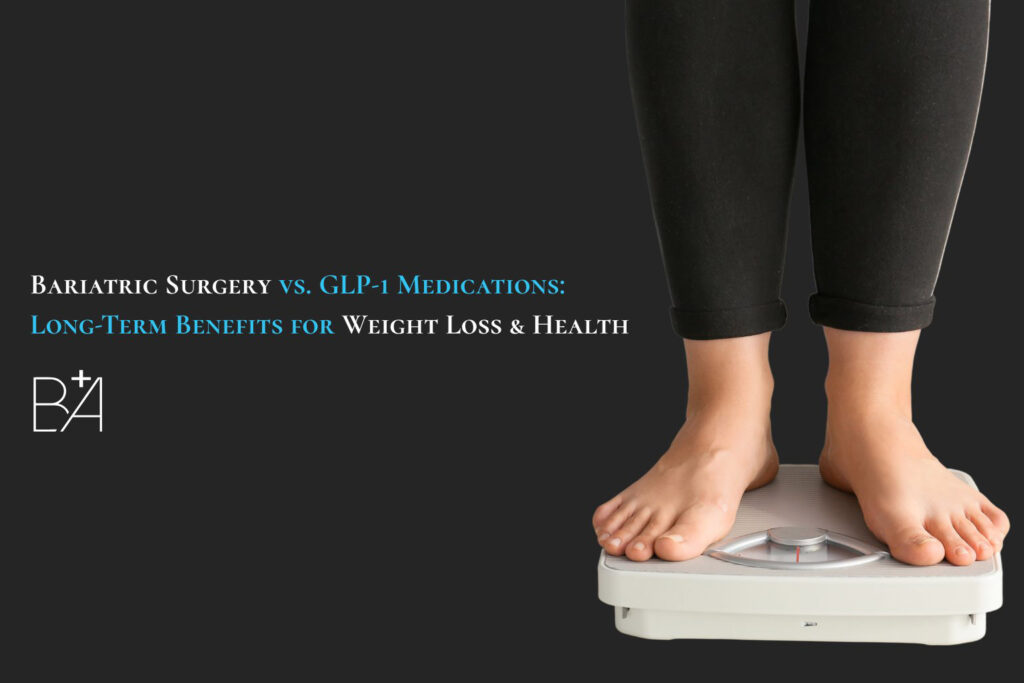Obesity is a complex, chronic disease, associated with a variety of serious health problems, called comorbidities, such as type 2 diabetes, high blood pressure, sleep apnea and heart disease. For people who suffered from severe obesity, there are two leading treatments to treat this: bariatric surgery and medications such as using GLP-1 receptor agonists (such as semaglutide and tirzepatide). Although either can be associated with a marked amount of weight loss, the appreciation of their long-term utilities, especially vis-à-vis comorbidity resolution, is essential to be able to consider rational treatment choices.
New advancements and real-world studies are continuing to reveal the durable benefits of these solutions, with the latest evidence demonstrating that bariatric surgery achieves more sustainable long-term weight loss and resolution of obesity-related conditions than other treatments.
The Sword in the Fountain: Bariatric Surgery as a Legacy Item
Bariatric surgery (e.g., sleeve gastrectomy, Roux-en-Y gastric bypass) have a long history of achieving significant weight loss that is usually maintained long-term. Weight loss occurs early and steady, with total weight loss occuring the first 12–18 months. Long term studies are consistent with the fact that the majority of patients continue to keep off 50–70% of their excess body fat after 10 or more years.
Not only do patients lose weight with bariatric surgery, but it is great at resolving or greatly improving illness that are related to obesity.
Type 2 Diabetes: Bariatric surgery is currently the best treatment for type 2 diabetes among obese patients; remission rates frequently exceed 70% in the setting of early surgical intervention. “The metabolic effects of surgery, such as changes in gut hormone levels, influence insulin sensitivity and glycemic control.”
Cardiovascular: Multiple trials have demonstrated a significant decrease in cardiovascular events (MI and CVA) after bariatric surgery. It also drives dramatic reductions in high blood pressure and high cholesterol.
Sleep Apnea: Resolution of sleep apnea is yover 85% post bariatric surgery as there is loss in the weight which lessens the pressure on your airway
Fatty Liver Disease: One of the things that bariatric surgery has a talent for is getting rid of liver inflammation and lowering the likelihood of bad liver issues.
Better Quality of Life & Longer Life Span: As evidenced by patients continue to illustrate, quality of life, mobility and mental wellbeing increases dramatically. Additionally, studies have shown that people who have bariatric surgery live longer than obese people who don’t.
The Rise of GLP-1 Medications: A Promising, but Different, Path
GLP-1’s have transformed the field of medical weight loss by providing significant weight loss and cardiometabolic benefits. Weight losses with this medication have been impressive in clinical trials, with some of the newer agents demonstrating total body weight loss of 15–20%. Those drugs mimic a natural hormone that controls blood sugar levels, slows emptying of the stomach and suppresses appetite.
GLP-1s also show promise in improving comorbidities:
Diabetes Treatment: They are very effective in reducing blood sugar in the case of type 2 diabetes.
Cardiovascular Advantages: Certain GLP-1s have shown evidence of a cardiovascular benefit and are associated with a smaller likelihood of major adverse cardiovascular events.
The difference between medications like GLP-1s is that in comparison to bariatric surgery, medications end up being a temporary bandaid to lose weight. Clinical experience shows weight regain being the rule if GLP-1 is stopped, despite its effectiveness. Gastrointestinal side effects are also common, and may affect adherence. In contrast to surgery, GLP-1 drugs generally need to be taken on an ongoing basis to achieve continued benefit, meaning there are continued costs. Recent analyses also indicate that the combined cost of long-term GLP-1 therapy can quickly exceed the one-time cost of bariatric surgery.
Comparing the Two: Surgery vs. GLP-1
| Feature | Bariatric Surgery | GLP-1 Medications |
| Weight Loss Durability | Long-term (10+ years) | Short-term unless maintained |
| Comorbidity Resolution | High for T2D, sleep apnea, hypertension | Moderate, reversible |
| Need for Ongoing Treatment | No (once recovery is complete) | Yes (often indefinite) |
| Cost Over Time | One-time procedure, may be covered | Ongoing monthly cost |
| Impact on Metabolism | Yes – hormonal and anatomical changes | Yes – pharmacological, not structural |
| Lifestyle Change Required | Yes – critical for success | Recommended but less emphasized |
Recovery and Side Effects: Surgery vs. GLP-1
Being aware of the recovery and possible complications is critical when contemplating bariatric surgery or GLP-1 medications. Both have distinct profiles.
- Bariatric Surgery: Recovery Soon After Surgery, Over the Long Term: After bariatric surgery, your first recovery happens with some pretty detailed dietary changes. Generally, you begin with a high-protein liquid diet the first week, and you can often ease into light exercise almost immediately. The majority of immediate complications are procedure-related. These could be nausea from the anesthesia or pain at the wound site. While this form of sudden or rapid weight loss can have quite a few side effects on the body, you would definitely feel some level of fatigue. This is when following a dedicated nutrition plan will help — it helps control the symptoms and make sure you are getting in the nutrients you need through this life changing process.
- Drugs for GLP-1: Side Effects and How to Deal with Them: GLP-1 drugs operate differently and have their own list of potential side effects. Nausea, fatigue, dizziness, and constipation are among some of the most common. These tend to be gastrointestinal. One drawback with GLP-1s is tolerance: only about 40 percent of people can tolerate them long enough to get the sustained results they want.
Insurance and Costs: A Key Deciding Factor
Cost/insurance coverage/financial investment in treatment: This can be a big thing to consider when making a decision. It is important to note differences between bariatric surgery and GLP-1 agents.
- Bariatric Surgery: Cost Differences, Possible Coverage: The price of bariatric surgery is different for everyone, mostly because it depends on what kind of operation you will be having is vital, but the price will also vary drastically on what type of insurance you have. Each insurance company will have a set of requirements that you have to satisfy to be reimbursed. It pays to look for coverage, to check with your insurer at least early on to see what they might cover and under what criteria.
- GLP-1 Drugs: High Monthly Costs, Coverage by Diagnosis Varies: GLP-1 drugs, including those prescribed just for weight loss, tend to be not covered by insurance. Brand names such as Ozempic can be pricey, often hovering around $1,000 or more per month. And there may be dirt cheap generics, but since you’re staying on it… Those go up.
- But if you have type 2 diabetes, there are some GLP-1 medications cleared for this use. For these, insurance may cover up to much of this cost, which means your vision correcting procedure may cost you far less.
The Long Term Winner: Surgery Has the Upper Hand
In a recent head-to-head real-world study, bariatric surgery (sleeve gastrectomy and gastric bypass) was linked with five times more weight loss observed than with weekly GLP-1 receptor agonists after 2 years. Those undergoing surgery lost an average of 58 pounds (24 percent total weight loss) compared to 12 pounds (4.7 percent) for those taking GLP-1s for more than six months. Even patients on continuous GLP-1 therapy for a full year lost significantly less weight (7% total weight loss) than surgical patients.
Moreover, the amount and duration of weight loss play a key role in the resolution of comorbidities. Efficacy of bariatric surgery in producing greater, more sustained weight loss is a correlate of significantly improved rates of diabetes remission and more substantial improvement of other obesity related co morbidities. Even with their great efficacy however, they do have not-insignificant drawbacks including in many cases the need for indefinite treatment to maintain effect), and unlike bariatric surgery they long term effectiveness to resolution (rather than just improvement) of comorbidities still lags that of bariatric surgical procedures.
Conclusion
For individuals with severe obesity and associated comorbidities, bariatric surgery stands out as the most effective and durable long-term solution for both significant weight loss and the comprehensive resolution of health complications. While GLP-1 medications are a valuable addition in the fight against obesity and offer many benefits, particularly in the short to mid-term but for some patient populations, they currently do not offer the same level of sustained weight loss or comorbidity remission as bariatric surgery. The decision between these two powerful interventions should be made in close consultation with a healthcare provider, considering individual health profiles, goals, and long-term commitment to treatment.
Ready to take the next step in your weight loss journey? Contact B+A Medical Center today to explore your personalized solutions.


